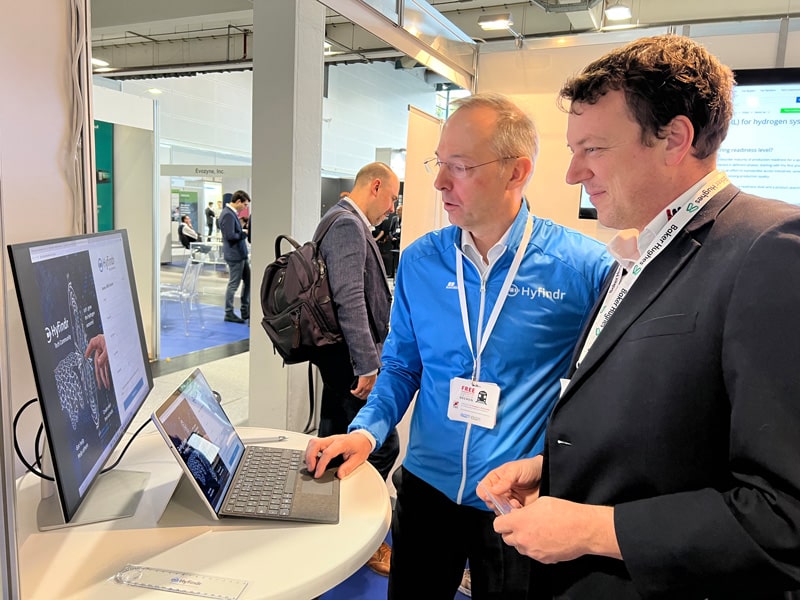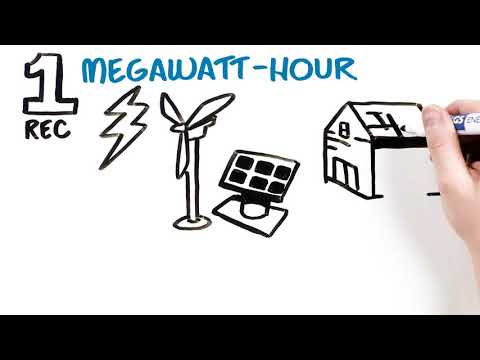
An interesting approach to furthering hydrogen education and the sharing of ideas is being taken by the startup Hyfindr. During the Hydrogen Technology Expo Europe in Bremen (see p. 9) mid-October 2022, the young company presented its new concept publicly for the first time: an internet platform with the goal of using the expertise of professionals from the hydrogen and fuel cell industry by setting out targeted technical questions that could – so the hope is – be answered by experienced people. At a time when Xing is in the process of closing its discussion groups, Tech Community could become a fresh forum that focuses less on quantity and more on quality. H2-international spoke about it with the two founders, Dr. Björn Lüssow and Steven Oji.
Hello Björn, hello Steven, you have just presented in Bremen your new expert forum Hyfindr Tech Community for the first time. How was the response?
Björn: Very inspiring, Sven. Almost all of the people that we introduced the Hyfindr Tech Community to were immediately excited about it and signed up right after the trade fair. It is evident to every professional in the hydrogen industry that the development and implementation of projects is accompanied by numerous technical challenges. Our Tech Community makes it possible to resolve technical questions quickly and efficiently. I was particularly pleased with the positive feedback I received from students and young professionals; there is a huge demand for knowledge. Many want to work in the hydrogen industry and need digital tools to educate themselves. This is where we come in.
Before, you had only been granting access to the new platform to a small circle of people. Why the initial hesitance?
Steven: Every community lives on the engagement of its members. Only when members of a community are also engaging, which means in our case also really helping with technical questions, are others inspired to join in. No one wants to be a member of a “dead community.” For this reason, we started small, with a few highly motivated professionals that we already knew or suspected would help us. We first invited these people to a beta testing and then asked for feedback. We knew that not everything would be immediately optimal in the beginning.
Among other things, you offered online workshops in advance, where the various functions were explained to the initial participants. What was the feedback?
Björn: That’s right. And from this we also received reassurance. We held several video meetings with up to ten participants to personally present the goals of our initiative. Doing this was important to me for another reason: only in personal exchange can we really get a feeling for whether an initiative has usefulness or if we are making presumptions. Luckily, the feedback was – as already stated – very positive. We now have several hundred members already, who are diligently discussing technical topics.
I see. So please briefly explain exactly what you have actually built and now offer.
Björn: Gladly. Online communities are not just private test projects or hobbies these days; they now also have great relevance for professionals in many industries. The best example of this, in my opinion, is Stack Overflow. In this forum, hundreds of thousands of software developers freely help each other with programming problems every day. You can find there more than 23 million questions and answers, and the community is visited over 100 million times every month. The more high-quality content a member contributes, the clearer their expertise becomes in their profile. Software developers are now applying for jobs with the authority they’ve earned in the Stack Overflow community, and no longer with just CVs. I am very impressed by this community, and I asked myself why there was no comparable community for the hydrogen industry, as there are currently many questions to be answered in the hydrogen industry around the world as well.
What distinguishes your concept from Xing, LinkedIn or other forums?
Steven: LinkedIn and Xing are primarily marketing channels and platforms to establish business contacts. On LinkedIn, people don’t ask technical questions. Or have you ever seen a question there like “Does every fuel cell stack really need a humidifier?” The following difference is also interesting. Groups, for example on LinkedIn, that were started for idea exchange mutate once they get bigger and bigger into a pure newsfeed. This reduces the benefit for the individual group member. No one can read all the new project updates on LinkedIn anymore. With a Q&A forum like the Hyfindr Tech Community, it is different, because the value for the individual member increases the larger the community becomes. With a large number of members, the probability of finding an expert or two for a specific question is higher. One person asks a question and the intelligence of the entire community answers. In a community like Stack Overflow, it is also often the case that someone has already had the same problem and can therefore let good answers to the similar problem be found. That is efficient, and that’s where we want to go with the Hyfindr Tech Community. It would therefore be great, Sven, if many of your readers registered as members and participated (community.hyfindr.com).
You two have been active in the hydrogen industry for a long time, but an internet platform is completely new ground for you, right? Björn, what did you do before this?
Björn: I worked at Mercedes for nearly twenty years. As a lawyer, I helped arrange small, and also very large, partnerships and M&A transactions over the course of more than ten years. I got my connection to the hydrogen industry in 2013, when I got to support in establishing the joint venture H2 Mobility. I figured at the time that hydrogen was our chance to get out of oil. An entrepreneur was what I’d always wanted to be. That’s why I initially studied business and earned the Diplom-Kaufmann degree before studying law. When I started my studies, I was actually much more interested in economics than law. Even though I have no training as a software programmer, I can assure you that I am truly immersed in the IT world from my independent study during the last three years in preparation for Hyfindr.
And you, Steven?
Steven: I represent more of the technical side of Hyfindr. Like most of our employees, I’m a passionate engineer. Like Björn, I worked for Mercedes-Benz for several years, where last I was developing FC systems. I did that afterwards in another company as well, before I devoted myself completely to the establishing of Hyfindr and everything associated with that. For many years of my life, for professional or private reasons, I lived in countries where energy supply via diesel was a necessary given. Already in my childhood years, I wanted to change this in some way, because it generates a lot of noise and pollution. It already disturbed me back then.
You then found Hyfindr together, which is already off to a pretty good start. Please briefly explain what exactly Hyfindr is.
Steven: Hyfindr.com is the rapidly growing B2B marketplace for the global H2 industry on which you can find many components, systems and services that are now needed to build this industry. We place particular value in that engineers especially can find all information relevant to the industry directly on the site. I had these problems myself when I was developing fuel cell systems. And it is still very difficult to find the right components. Here is where Hyfindr comes in handy. Products can be compared on the basis of technical criteria with just a few clicks, and price quotes can be efficiently requested from suppliers. This reduces negotiation costs for both the buyer and seller. Unlike a trade fair, Hyfindr.com runs 24/7, 365 days a year. Industry professionals visit us when they have a specific need. We like to point out to sellers of these products, “We drive in customer interest while you sleep!”
This new platform, Tech Community, is now only one of several mainstays of Hyfindr, right?
Björn: It’s true that we have developed several formats, but our B2B marketplace is at the core of our business model. Hyfindr Tech Community is not meant for economic advancement. With this, we want to contribute to making it easy for young professionals in particular to join the H2 industry. For this reason, marketing posts are also forbidden in our Community. It’s about helping each other solve technical issues. In our Hyfindr Knowledge Hub, there are already more than 30 neutral articles that convey the technical basics. Here, professionals can find out what they need to know before buying hydrogen tanks, filters or compressors. This collection of knowledge too we are continuing to expand, and it’s available free of charge on hyfindr.com.
How is the marketplace there developing so far?
Steven: The development is incredible. We launched it in September 2021, and since then we have been growing on average between 10 to 15 percent every month. In the meantime, more than 100 well-known brands have listed their products and services. Thousands of users visit us every week, who look at several pages. From this enormous amount of traffic, we also generate week after week numerous high-quality leads for the companies. So far, we have not unlocked, as I see it, even ten percent of the potential of Hyfindr, as we still have to become better known. The development, however, is pointing steeply upwards. Since June 2022, we have also been supported by no less a company than Google. We are one of very few companies in Germany to be included in the international program “Google for Startups.” This helps us a lot.
Compared to the earlier hype around hydrogen, what is different today from your point of view?
Björn: This time, I think it is a sustained development, as it’s not only prototypes or demonstration projects, but strategic investments being made worldwide. In some countries, the fuel cell industry is even scaling up already. However, the actual effects will only become apparent in the next few years, with sector coupling. I am firmly convinced that all doubts whether the hydrogen industry can develop into an economic sector similar to the oil and gas industry will fade within this decade.
Steven: With that, I can only agree. And as an engineer, I would like to add the following. The clean energy transition requires new technical solutions. With battery technology alone, we won’t be able to build all the solutions we need to become greener. Hydrogen and fuel cell technology are not the only, but a very important, building block of the energy transition. I’ve lived in South Africa and Nigeria next to chugging diesel generators that ran air conditioners and produced electricity for lanterns. We can’t go on like this as a planet. So I have a personal motivation as well to contribute with Hyfindr to making the growth of the global hydrogen industry faster and better. This mission drives me and also Björn.
Where do you see your marketplace and Tech Community in five years?
Steven: You could say that we have set out to become the Amazon of the hydrogen industry. With Hyfindr.com, we are building a digital supply chain for the global hydrogen industry so that it can grow faster. Professionals should be able to rely on Hyfindr as a place to find all the relevant products available. Everything starts very small, with one or two people who have an idea and pursue it consistently. That’s what we’re doing with Hyfindr.
Björn: With our Tech Community, we want to become the Stack Overflow of the hydrogen industry. I promise to tell you when we’ve reached a hundred thousand questions and answers in Hyfindr Tech Community, Sven. Once we do this, we will have significantly accelerated the hydrogen economy. It’s inconceivable to build a new industry, like the hydrogen industry, only with the tools from yesterday. Hyfindr wants to offer digital tools to promote the growth of this industry on a global scale. That’s what I work for.
Thank you very much for these insights.
B2B Marketplace: www.hyfindr.com, Tech Community: www.community.hyfindr.com
Interviewer: Sven Geitmann







